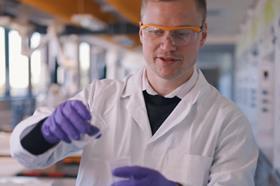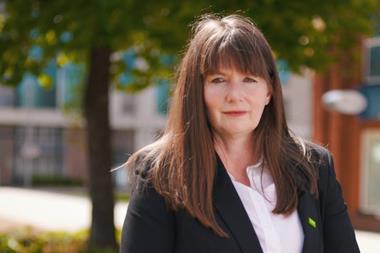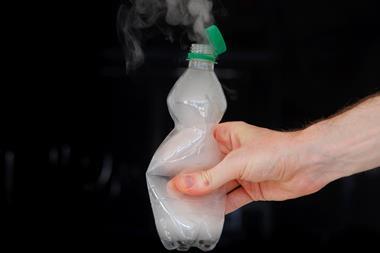Everything you need to know
-
- Salary range: £40k+. Anything from £30,000–£50,000. However, you will need to find funding. When you start a company, there is very little job security and if you run out of money you will not be able to continue.
- Minimum qualifications: Degree-level qualifications (including master’s). At the very minimum, an undergraduate degree in chemistry is usually required – you need to understand the fundamental science behind your company technology in order to effectively communicate it to the world.
Undergraduate degree studied at: University of Southampton - Skills required: Strong subject knowledge, project management, problem solving, collaboration, tenacity and resilience. For the role of CEO, communication and leadership skills are vital.
- Work–life balance: Senior roles might require working overtime. There may be the opportunity to work flexible hours.
- Locations: Find related work experience positions using our map of employers
More profiles like Daniel's
Hi, I’m Daniel (he/him) and I work as the chief executive officer (CEO) of ViridiCO2, an innovative start-up company based at the School of Chemistry at the University of Southampton.

What does your company do?
ViridiCO2 enables large carbon dioxide (CO2) emitters, like chemical manufacturers, to use CO2 as a raw material (feedstock) in the production of high-value chemicals. These can then go on to be used in products such as furniture, cars and clothing. Based upon my PhD work, we have developed a pioneering catalyst system that is capable of transforming CO2 in a much more sustainable way than any current technology.
How does your work affect the world around us?
We are providing large CO2 emitters with a way to reduce their carbon footprint and contribute to the circular economy. Our work gives companies a way to directly use their waste CO2 in processes that create the raw materails for items that can be sold for profit. And the CO2 directly replaces traditional petrochemicals, which are derived from fossil fuels, further increasing the products’ sustainability.
What is your typical day like?
My job is to manage the overall operations of the company, make decisions that affect the direction and focus of the company, and to ensure we are effective in delivering our company objectives. I report directly to our board of directors for the performance of our company.
Day-to-day, I liaise with several different company functions – the technical team, our shareholders, current and potential clients. As we are a start-up company, I am also responsible for all the background operations such as payroll, HR, IT, marketing – everything that makes the company work smoothly and effectively!
Why did you choose chemistry?
I have always loved chemistry because it has allowed me to understand the processes that are happening around me at a fundamental level. I am a naturally curious person who wants to understand how things work, and chemistry often provides the answers.
I am motivated by the opportunity we have for ViridiCO2 to play a pivotal role in achieving global net-zero emission targets. The consequences of not doing so will be catastrophic, and I don’t want to stand aside and let that happen.
What do you love about your job?
I love that my job is incredibly diverse, not only in terms of the day-to-day tasks I carry out, but with the people and companies that I interact with. I love working in an immensely important, relevant area of science which is actively solving a global crisis, and playing a key role in how we deliver that solution to benefit the future sustainability of our planet.
How did you find your job?
Alongside my previous PhD supervisor, Prof. Robert Raja, I co-founded the company and made the decision to leave my research fellowship post to lead ViridiCO2. In forming the company, the CEO role was created and I stepped into it. In a way, choosing to form the company means I created my own job.
What skills do you need for your job?
For founding a chemistry-based company, a strong command of your relevant chemical discipline and technology is essential. As a start-up founder, tenacity and resilience will define your success.
For the role of CEO, communication and leadership skills are vital. The efficient transfer of information between your teams, stakeholders and clients is critical for successful delivery of your product/service. As CEO, you are the one making business-critical decisions, and to do so, you need to have the most information available to ensure those decisions are in the interest of the company. Great communication and leadership skills filter into other skills required of a CEO, including project management, problem solving, collaboration and open-mindedness.
What tips or advice would you have for someone looking to get into a similar role, or considering a career in chemistry?
Chemistry can bring about huge opportunities that I would encourage anyone to engage with if they enjoy science – it is an incredibly diverse and versatile subject that can take you into almost any discipline or profession, anywhere in the world. Chemistry doesn’t necessarily mean standing in a lab all day! When I started my undergraduate chemistry degree, I never dreamt about leading a company which is playing a role in solving the climate crisis. My chemistry training has provided me with the skills to succeed on a technical level, but also on a professional level.
What do you see yourself doing in the future?
In future, I want to be leading and growing ViridiCO2 to maximise the impact we can have on transforming our manufacturing industries into truly sustainable, circular industries which have no detrimental effects on the environment around us.
Want to know more?
- Read about on ViridiCO2 on LinkedIn
- Read more about Daniel’s work with ViridiCO2 on the Royal Society of Chemistry Emerging Technologies competition.
- Find out more about chemistry’s role in solving global issues here.
- Explore your study options, talk to a career adviser and look into gaining work experience.
Daniel Stewart MRSC, CEO of ViridiCO2.
Published October 2021























